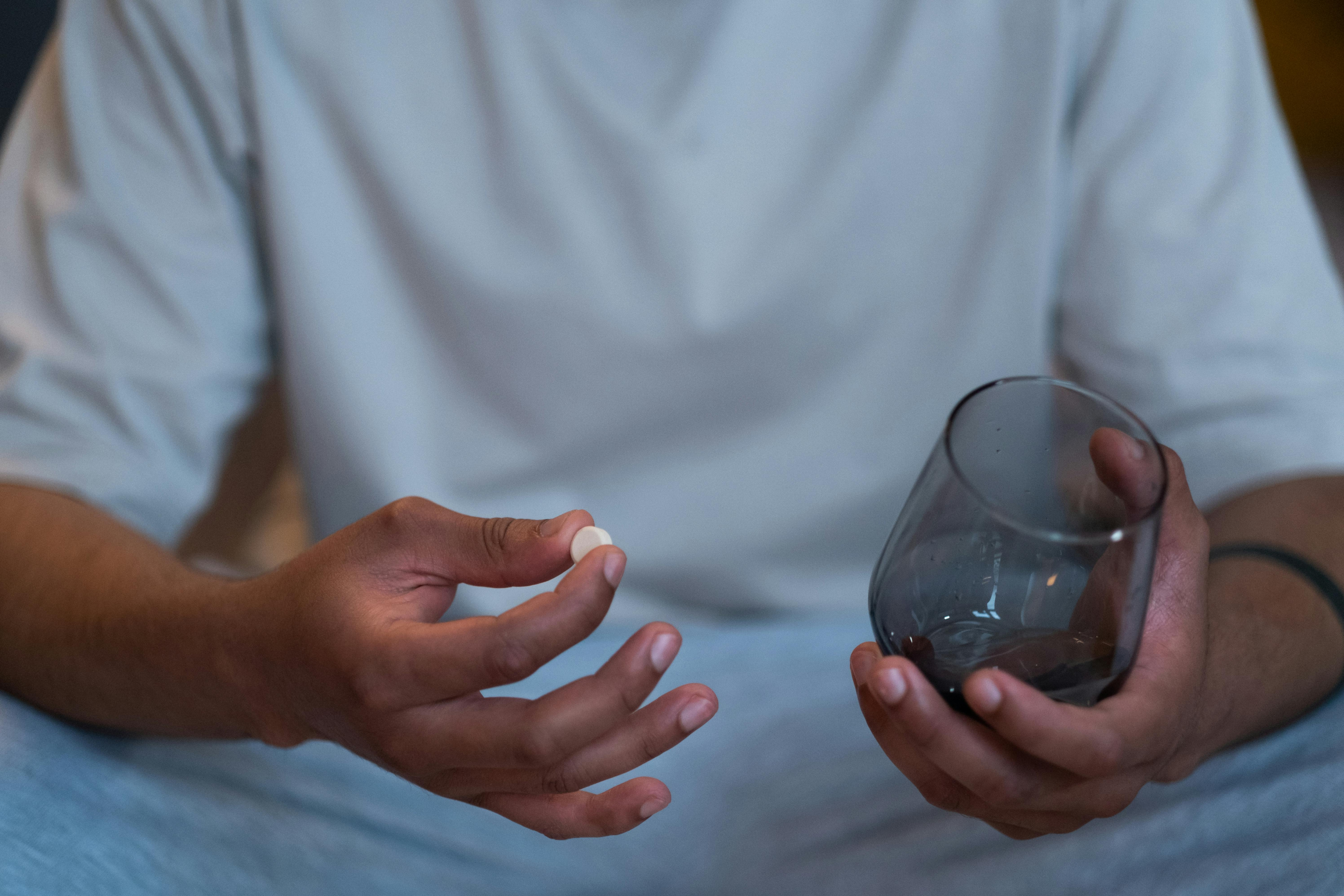Should Levothyroxine Be Taken at Night? Exploring the Optimal Timing for Thyroid Medication

Is taking levothyroxine at night just as effective as in the morning? If you’re navigating the dos and don’ts of thyroid medication timing, you’re not alone. This article aims to unpack the evening dosing debate, providing evidence-based insights to inform your levothyroxine routine and answer the question, “Should levothyroxine be taken at night?”—at a time that suits you best.
Key Takeaways
Levothyroxine, essential for treating hypothyroidism, can be taken at different times, with evening doses potentially leading to better absorption than traditional morning doses before breakfast.
Factors such as age, consistency, dietary choices, other medications, and timing of intake can significantly affect the absorption and effectiveness of levothyroxine therapy.
Adherence to daily intake of levothyroxine and maintaining a consistent schedule is critical to ensure stable thyroid hormone levels, and any changes in routine should be carefully managed to avoid hormone fluctuations.
Understanding Levothyroxine
Levothyroxine serves as an essential replacement for thyroxine (T4), the hormone that those with hypothyroidism are deficient in. This critical medication is taken daily to substitute for what the thyroid gland cannot produce, thus maintaining hormonal equilibrium within the body. Upon ingestion, levothyroxine transforms into triiodothyronine (T3), which is a more active form of thyroid hormone and integral to numerous bodily functions such as:
Metabolism
Cardiac operations
Digestive processes
Muscular coordination
Cognitive development
Bone health It helps regulate levels of thyroid stimulating hormone to ensure optimal performance of the thyroid.
Experiencing hypothyroidism can be challenging. Symptoms include relentless fatigue, unexpected weight gain, and chronic constipation along with dry skin issues, hair thinning problems, and increased cold sensitivity. It’s quite difficult indeed. Nevertheless, proper administration of levothyroxine can significantly mitigate these effects, allowing individuals suffering from underactive thyroid conditions to enjoy life normally again. Effectiveness hinges on correct dosage adherence – there’s more detail worth examining here.
Thyroid hormone levels
With the progression of age, our body’s metabolic rate decreases, including the metabolism associated with thyroid hormones. Consequently, there is often a need to alter levothyroxine doses for older adults to maintain proper levels of thyroid hormone. Speaking, euthyroid individuals who are older may receive a levothyroxine dose that’s roughly one-third lower than what younger people might be prescribed.
Steadiness in taking your medication plays an essential role too. If you’ve ever forgotten to take your levothyroxine pill, know that it happens quite frequently. Maintaining consistent hormone levels demands regularity in therapy involving thyroid hormones. To ensure these hormone levels remain optimal even after missing pills here and there, doctors might tweak the dosage of levothyroxine accordingly.
Thyroid function tests
To determine the appropriate dose of levothyroxine, thyroid function tests are essential. They play a critical role in evaluating how well the treatment is working and confirming that patients receive the correct dosage. Some elements can disrupt these assessments. For example, biotin supplements have been known to affect test accuracy, which might then mislead healthcare providers when adjusting levothyroxine dosages.
It’s noteworthy that when patients take their levothyroxine, it could impact their test outcomes. Consuming this medication at night may lead to lower TSH levels while increasing free thyroxine and total triiodothyronine compared with morning administration. This observation has significant ramifications for treating individuals with gastrointestinal conditions because there’s an imperative need to monitor TSH and free T4 levels carefully so as not to inadvertently induce hyperthyroidism through therapy adjustments.
Morning vs. Night: When to Take Levothyroxine

If you’ve been wondering about the ideal timing for taking your levothyroxine, rest assured that this is a common query among many patients. The long-standing advice has been to administer thyroid medication early in the day prior to eating breakfast to enhance absorption. Nevertheless, recent studies indicate that flexibility in dosing time may be possible with levothyroxine. Indeed, some research points out improved absorption when it’s taken at night.
The transition from taking doses of levothyroxine in the morning compared to evening seems not significantly affect its efficacy as a therapy option. Numerous patients find administering their dose at bedtime more convenient since it doesn’t conflict with their morning routines involving breakfast or coffee consumption. Before altering your schedule from daytime to nighttime dosage, it’s crucial you weigh up both advantages and disadvantages associated with each approach regarding administration times.
Morning administration
Individuals who opt for the conventional approach of administering levothyroxine in the morning should ensure that they take their thyroid medication at least 30 minutes prior to eating breakfast. This practice promotes enhanced absorption due to the overnight fasting period, essentially offering a head start and reducing food-related interference with the medication’s effectiveness. It’s akin to positioning your thyroid treatment ahead in the day’s metaphorical race!
Nighttime administration
Alternatively, for those who are more active at night or find the morning wait to eat too burdensome after taking levothyroxine, ingesting it at bedtime could be a viable choice. Research indicates that this method of dosing might actually enhance absorption compared to morning intake prior to breakfast. That said, you can’t just take the medication and immediately go to bed.
Administering levothyroxine during nighttime necessitates abstaining from eating anything for three to four hours following your last meal or snack. Maintaining such an interval is essential in order to maximize the drug’s absorption and prevent food from interfering with its effectiveness. Adhering to this routine may prove somewhat difficult if you’re accustomed to eating late in the evening. Many may find improved absorption worth adjusting their habits for.
Factors Affecting Levothyroxine Absorption

Did you realize that various elements can affect the efficacy with which your body assimilates levothyroxine? Everything from what you consume, like your morning cup of coffee, to any additional medicines you might be taking, has the potential to influence how well this thyroid medication is absorbed. By recognizing these factors, patients are better positioned to make choices that optimize the effectiveness of their medicine.
It often comes as a surprise to many individuals under levothyroxine treatment just how much their diet could potentially impact its absorption. A range of foods and beverages have been found either to diminish or enhance the uptake of levothyroxine by our systems. While dietary fiber’s role in modifying absorption is not yet fully clarified, it underscores an area ripe for continued investigation.
Food and drink interactions
Consider the surprise of learning that your routine morning coffee could be disrupting the absorption of your thyroid medication. Or savoring a soybean salad at lunch, not knowing it might diminish the potency of your levothyroxine therapy. Indeed, foods like soybeans, walnuts, and those high in dietary fiber are known to affect how well levothyroxine works.
In a similar vein, caffeine beverages along with certain juices—grapefruit juice being one example—are capable of obstructing optimal absorption when taken alongside levothyroxine, thereby diminishing its intended effects. To circumvent this issue, it’s vital to allow for an interval of 30-60 minutes between ingesting levothyroxine and consuming breakfast or these specific drinks.
Medication and supplement interactions
Certain drugs and nutritional supplements have been identified to hinder the absorption of levothyroxine. Notably, proton pump inhibitors and iron supplements, along with various other medications, can reduce how effectively levothyroxine is absorbed.
Accordingly, to mitigate these interactions, it’s advisable that levothyroxine be taken apart from these conflicting substances—preferably 4 hours prior to or subsequent to ingesting any supplements or different medications. Hence, for those who are on several types of medications or supplements, meticulous scheduling of dosage times is critical in order to preserve ideal thyroid hormone levels.
Adherence and Consistency in Levothyroxine Intake
It is essential to emphasize the importance of adherence and routine when taking levothyroxine. Ensuring that you take your dose every day without fail is pivotal for maintaining even thyroid hormone levels in your bloodstream, which in turn guarantees the effectiveness of this treatment protocol.
Adhering to a fixed schedule for your levothyroxine dosage, be it during morning or evening hours, contributes significantly to maintaining consistent hormone levels and maximizing therapy efficacy. Persist with your medication regimen even if symptoms seem to improve. Discontinuation should only occur after consulting a healthcare professional. Patients must understand that symptom relief may not become apparent until several weeks into the course of taking levothyroxine.
Dealing with missed doses
Should you forget to take a dose of levothyroxine, there’s no cause for alarm. Take the missed dose promptly upon remembering, but if it’s close to the time scheduled for your subsequent dose, simply omit the missed dose. Continue with your usual dosing routine thereafter and do not attempt to compensate for any doses that were skipped.
It is typically not harmful to miss just one thyroid hormone dosage. Maintaining consistency in following your prescribed schedule is crucial for achieving the best results from thyroid hormone treatment.
Adjusting to a new routine
Transitioning to a new medication schedule can be challenging, but it’s not impossible. When adjusting to a new routine, it’s important to maintain an appropriate interval from the last dose to avoid fluctuations in hormone levels. Strategies such as setting alarms, using pillboxes, or aligning medication intake with daily tasks can help ensure regular intake.
Switching from morning to night intake of levothyroxine may require additional considerations. Here are some things to keep in mind:
Consider the impact on your sleep. Taking levothyroxine at night may affect your ability to fall asleep or stay asleep.
Be mindful of potential interactions with evening meals or snacks. Some foods or medications may interfere with the absorption of levothyroxine.
Remember, maintaining a consistent routine when taking levothyroxine is crucial to maintaining steady thyroid hormone levels.
Levothyroxine and Special Populations

Therapeutic administration of levothyroxine must be tailored to individual needs, as different groups may require unique dosing and management strategies. For example, while it is considered safe for pregnant individuals to take levothyroxine, the dose often requires adjustment in order to sustain proper levels of thyroid hormone.
Likewise, in older adults who are managing thyroid disease, various gastrointestinal conditions can impede the absorption of levothyroxine. This makes meticulous oversight essential when determining how best to ensure effective levothyroxine therapy in this demographic.
Older adults
In the elderly population, a variety of gastrointestinal conditions including:
celiac disease
atrophic gastritis (commonly occurring on an empty stomach)
lactose intolerance
Helicobacter pylori infection
These can impede the proper absorption of levothyroxine, which is essential for regulating thyroid hormone levels, especially in those with thyroid cancer.
It’s imperative that healthcare professionals consider these issues when prescribing the appropriate dose of levothyroxine to older patients.
Pregnancy and breastfeeding
During the critical times of pregnancy and breastfeeding, maintaining hormonal equilibrium is essential. It is safe to take levothyroxine throughout these stages. Indeed, women who have hypothyroidism before becoming pregnant Need a higher dose of their medication during this time. To maintain appropriate levels of thyroid hormone, blood tests are routinely conducted while a woman is pregnant.
Mothers who breastfeed can safely continue taking levothyroxine without harming their infant. If a lactating mother on levothyroxine observes that her child exhibits poor feeding behavior, consulting with a healthcare expert becomes crucial for proper guidance and care.
Summary
Managing hypothyroidism effectively often involves levothyroxine therapy. The success of this treatment hinges on several factors: the precise dose prescribed, maintaining a regular schedule for taking the medication, ensuring optimal absorption by being mindful of when you ingest it in relation to meals and other substances, and consistent daily usage. It’s essential that regardless of whether one takes their levothyroxine dosage early with dawn or later at nightfall, consistency is key—and vigilance against interactions with foods, beverages, and concurrent medications must be maintained.
Whether you’re someone who greets the sunrise with enthusiasm or embraces the quiet of evening hours. Whether advancing in years or navigating pregnancy—your regimen involving levothyroxine can be adapted to dovetail seamlessly into your unique circumstances. Adapting to a new routine for medication might present its challenges, but forging an effective plan—with support from medical professionals—can establish an approach that aligns well with individual preferences. Here’s raising a glass to achieving thyroid health stability alongside overall wellbeing!
Frequently Asked Questions
Can I take my levothyroxine at night instead of the morning?
Certainly, for enhanced absorption of levothyroxine, administering it at night is permissible. Ensure a gap of 3-4 hours post your last meal to optimize its efficacy.
What happens if I miss a dose of levothyroxine?
Should you forget to take a dose of levothyroxine, administer it at your earliest convenience. If the time is nearing for your subsequent dose of levothyroxine, forego the missed dose and resume your normal dosing routine.
Can certain foods and drinks interfere with levothyroxine absorption?
Indeed, the absorption of levothyroxine can be hampered by certain foods such as soybeans, walnuts, dietary fiber, and beverages containing caffeine. Grapefruit juice is also known to affect how well levothyroxine is absorbed.
It’s essential to consider these potential interferences with the effectiveness of levothyroxine when you are on this medication.
Can I continue taking levothyroxine during pregnancy and breastfeeding?
Certainly, it is safe to persist with levothyroxine intake while pregnant or breastfeeding. It’s important to monitor and modify the dosage as necessary, ensuring frequent blood tests are conducted throughout pregnancy.
Can other medications interfere with levothyroxine absorption?
Indeed, medications such as proton pump inhibitors and supplements like iron can disrupt the absorption of levothyroxine. To guarantee optimal absorption of levothyroxine, it is advisable to administer it with a 4-hour separation from these substances.


